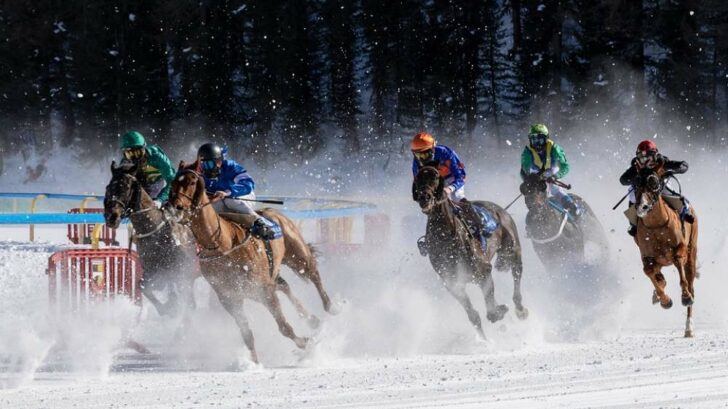Weather Conditions And Their Effects On Horse Race Betting

The Impact of Weather Conditions On Horse Racing
Horse race betting is big business and around the world punters spent literally millions of dollars every year with online sportsbooks like 22Bet Sportsbook, backing that favourite racehorse. One of the factors that makes wagering on this sport so exciting and immersive is that it requires much more than just luck. In order to beat the bookies you need to have a high degree of knowledge, and not just about the horse. Important factors to consider are such things as the history of its racing career, the type of race track the horse prefers, who the jockey is, and the weather conditions.
This last factor has a huge influence on the outcome of horse races. That’s because weather conditions impact the going. Extreme weather will complicate race days for all bettors. On the other hand, if you’re a smart punter, you can use the weather as a useful variable to your own advantage. Weather conditions can also allow you to pick the best bet selection.
Dirt And Turf Race Tracks
Racing on turf simply means racing on grass. Racing on dirt means that it’s a surface that’s made up of dirt and sand on top of clay, with gravel within the mixture. When it comes to horse racing in Europe, you find that turf is by far the most popular racing surface. Unfortunately, weather conditions exact a heavy influence. As you well know, the typical stereotype of an Englishman is carrying an umbrella. This alludes to the fact that there is a lot of rainfall in England, and this had a huge influence on turf racecourses. There are two major ways the weather affects the race track.
Dry Weather Conditions
In dry weather conditions, the turf will become hard. Essentially, this means that there’s less “give” under the horse’s hoof. In practical terms, horses will often struggle as a consequence. This is because as the horse runs in these conditions, every step is increasingly harder. In such conditions, the turf course starts to replicate the conditions of a dirt course. Horses that are used to racing on regular turf will begin to struggle.
Heavy Weather Conditions And Continuous Rainfall
A lot of rain will cause the turf course to become soft. As such, the horse’s hoof will sink deeper into the track. Just like walking through sand, this means that the horse will require much more energy in order to run, let alone run fast. In such conditions, the race becomes more about endurance than speed. As the race progresses, you will see that it’s impossible for a horse to have that explosive burst of speed. Keep in mind, that if you’re looking to win the jackpot online, then in these conditions, a fast horse with less endurance will struggle to meet its full potential.
Difficult And Dangerous Weather Conditions

In dry conditions, the dirt course remains the same. But just like turf, wet weather will have a detrimental effect. If it’s been raining, then the dirt track will become very liquid and in many cases, this will result in mud being kicked into the following horse’s faces. This can cause very unexpected race results. The horses following will drop back further to avoid a face full of mud. Another aspect that changes with wet weather is that the racetrack will become slippery. In some ways, in such a situation, the dirt track becomes similar to a turf track. Now for some horses, this can be a favourable change. But many dirt track racing horses will be unhappy on such a surface.
Bet on horse racing at the 22BET Sportsbook
Races Being Cancelled
With wet weather conditions being detrimental for horse racing, when the turf track is too wet then the race will be cancelled. This is to protect both the racetrack itself and the horses from injury. Also, it’s not just rain that can be a problem. No matter what surface the track is made from, snow and fog will make any course untraceable.
As you can imagine, cancelled race meetings are bad news financially. After all, bookmakers can’t take bets. This not only impacts their income but also means there’s funding for racing, better known as the “levy.” In addition, it means that the jockeys don’t get paid. Yet the racecourse still has to pay their staff. Trainers also suffer when there are race cancellations. The cancellations have a huge impact on trainers, too. Let’s take snow and frost as an example:
- Water: when it’s icy or frozen over it’s difficult to supply fresh water for the horses
- Cold: extra effort and work is necessary to feed the horses outside
- Fixtures: the schedules will be in disarray. Trainers will be trying to get several runners in the same race, making it more competitive than usual.
Obviously, cancelled races and bad race conditions are detrimental to the horses. Their fitness levels would decrease over the period. This is because fewer workouts happen due to impractical or icy weather conditions.
How “The Going” Effects Betting
In horse racing, weather conditions are often described as “the going.” It’s common sense to check how a horse has previously performed under certain weather conditions, such as very wet or muddy going before you place a bet. Essentially, you’re trying to match the horse’s past performance under certain weather conditions to the present ones. So if a horse has consistently performed well under specific race track conditions, then the probability is that is likely to keep doing so. Of course, you don’t have to bet on a rainy day. By keeping things simple, betting only on dry days is one of the best jackpot winning strategies.
Choose Dry Weather Conditions For Betting

Many 22Bet Sportsbook punters will only take a flutter on a completely dry track under good weather conditions. The reason for this is that all betting is not just about winning the individual wager itself. Rather, it’s about smaller, but consistent wins, that build up over time. And that’s why many gamblers only bet during favourable weather. Having said that, one of the biggest problems of betting in the UK is that the weather is very unpredictable. It can turn from sunny to rainy in less than half an hour. This means that if you bet too much in advance, there’s a possibility that these didn’t necessarily hold the same value by the time the race comes around.
The Bookies Factor In All The Betting Patterns
It’s important to bear in mind that though you might feel changes in the weather can be beneficial for your betting, this change has already been factored in by the bookies. To that end, they will have already changed their odds accordingly. You may think you are smart by noticing the horses that perform better under certain conditions. Of course, this will give them an advantage over the other competitors depending on the day’s going. But if you utilise this one factor in the hopes of winning, then you going to face disappointment. What’s more important it’s how you put this knowledge to use. Especially when it comes to placing bets.
Be Quicker Than The Bookie
We suggest that you shop around and only focus on identifying the odds which do not necessarily reflect the advantages or disadvantages you identified. What you’re looking for here is “EV” or “expected value.” Let’s face it, no one has a crystal ball. In many cases, the weatherman is wildly inaccurate. But it’s for you to try and predict the weather before a bookie can change his odds. If you can get your bet in before the bookie can adjust their odds and offer the best jackpot deals, you will have a concrete advantage. And thereby definitely increase your jackpot winning chances.
Click here to visit the 22BET Sportsbook














